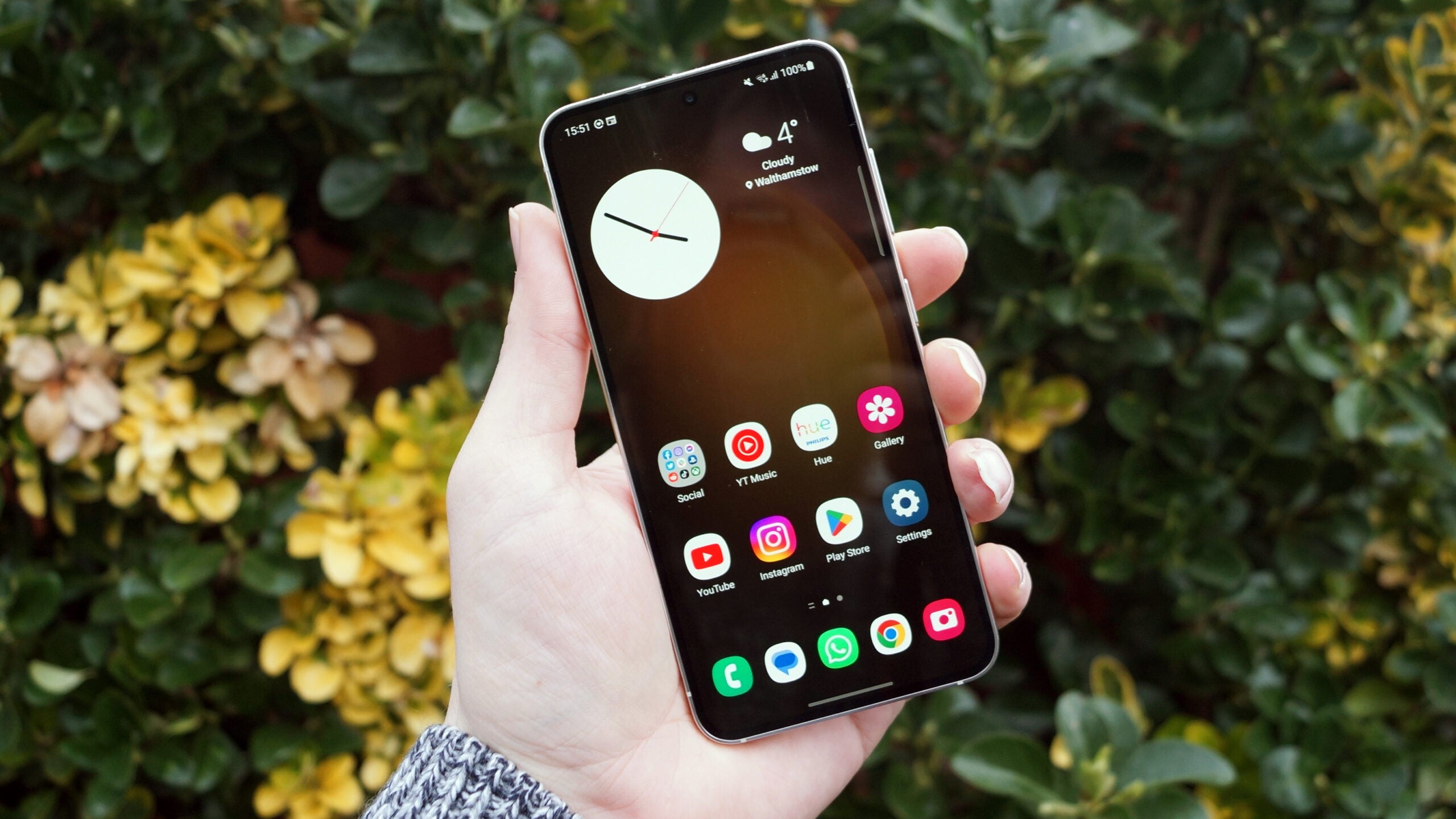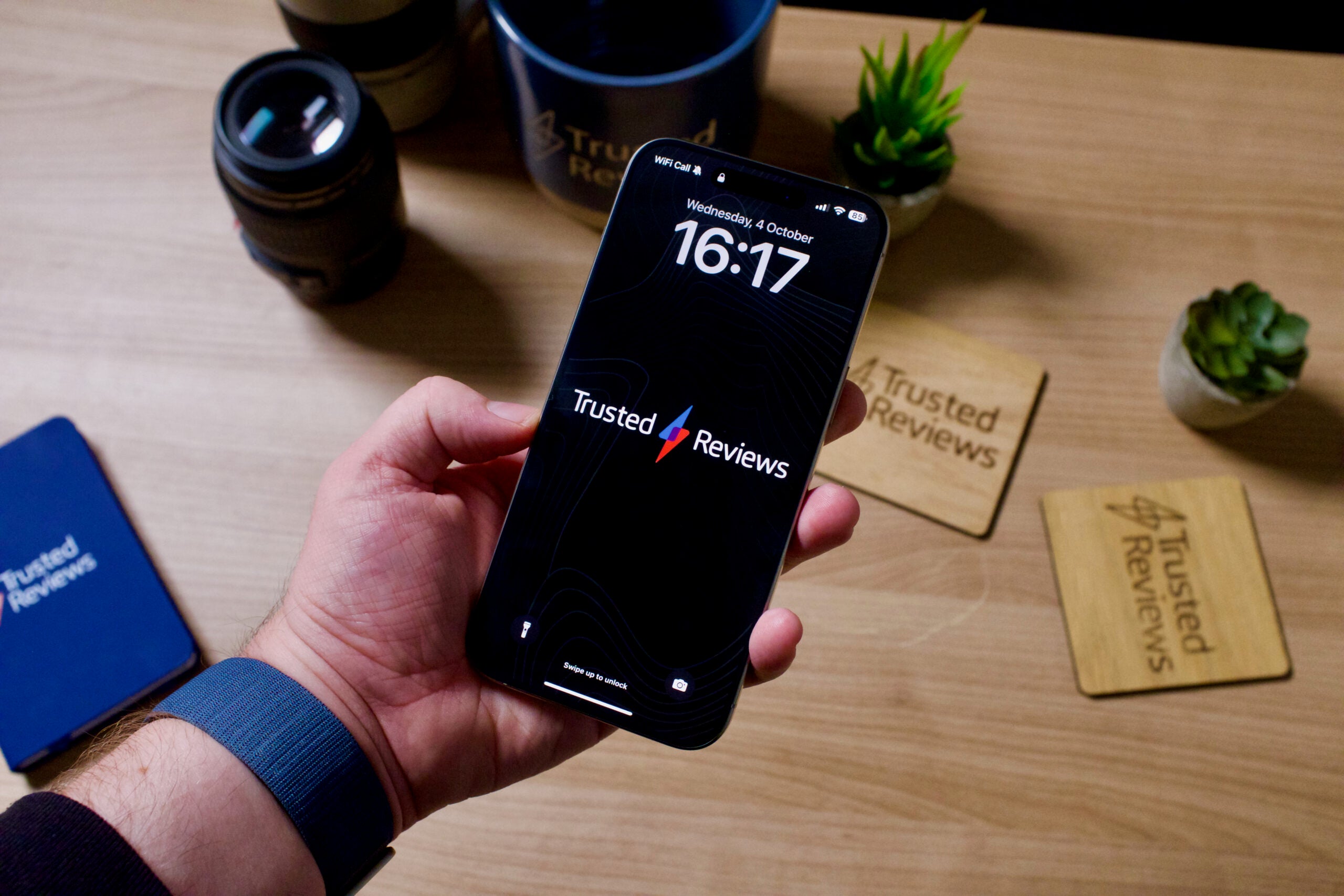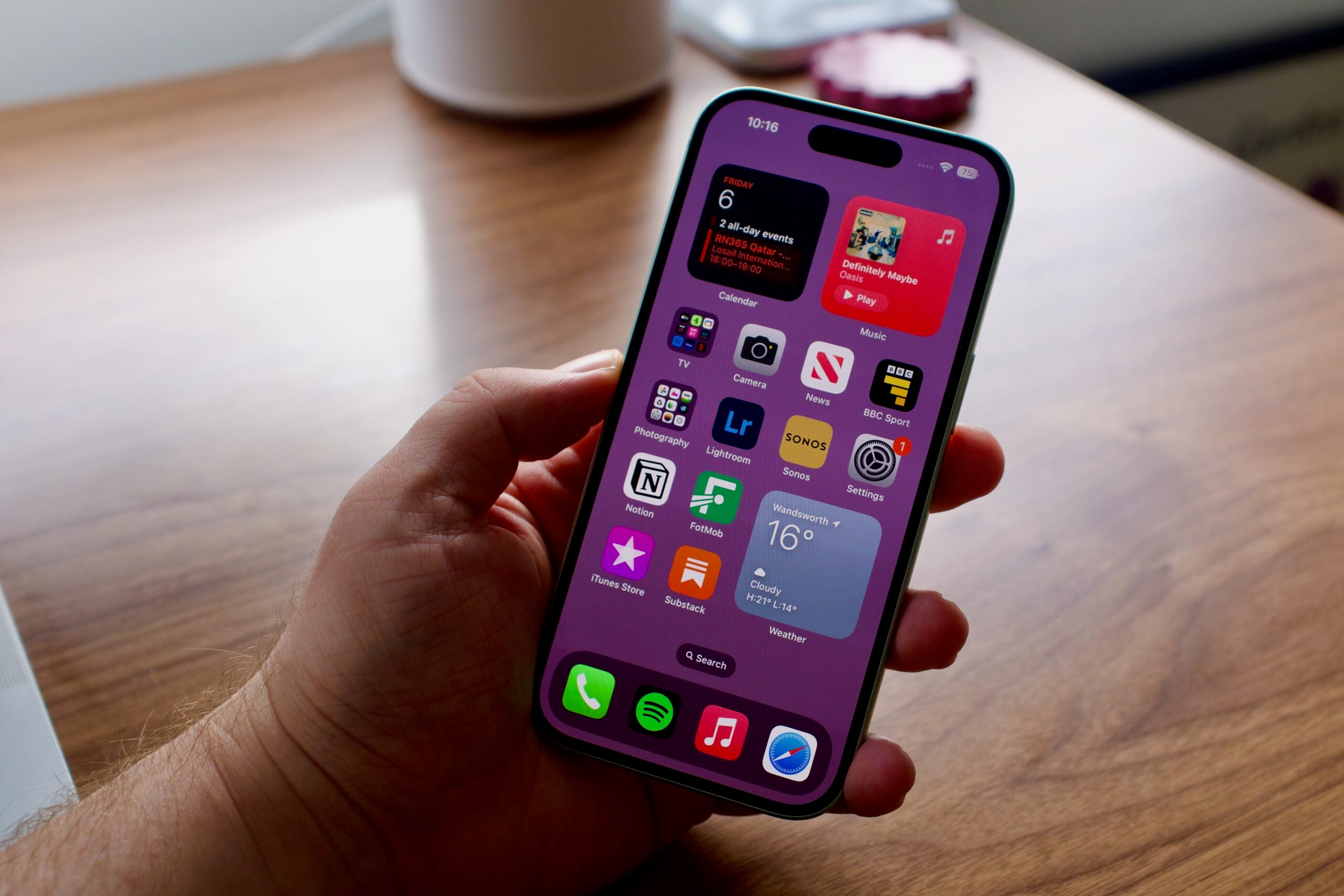OnePlus Open Review
The first uncompromising book-style foldable phone








Verdict
The OnePlus Open gets the book-style foldable formula right, boasting a no-compromise experience with excellent displays, great performance, custom foldable camera tech and fast charging, all at a price cheaper than most of the competition.
Pros
- Solid foldable hardware with minimal display crease
- Custom foldable camera tech
- Unique Open Canvas multitasking software
- True fast charging capabilities
Cons
- IPX4 water resistance isn’t the best
- Still hefty at 245g

Pre-order the OnePlus Open here
Pre-order the newest foldable on the market and get a free pair of OnePlus Buds Pro 2 worth £179 at the same time.
- OnePlus
- £99 deposit
- £1599 in total
Key Features
- Premium foldable techThe OnePlus Open’s Flexion teardrop-shaped hinge allows for a near creaseless foldable experience, with just a slight change in touch as you run your finger across it.
- Impressive camera performanceSporting three high-res camera sensors custom-designed for foldables, the OnePlus Open delivers a versatile shooting experience.
- Unique approach to multitaskingOnePlus’ Open Canvas multitasking software allows you to run up to three apps in full-screen mode at once, with a simple tap of the edge of the display to switch between them.
Introduction
The OnePlus Open is an impressive book-style foldable that looks to directly take on the titans of the industry, Samsung.
The phone is the outcome of a partnership between OnePlus and parent company Oppo, with the two working together on foldable hardware. But if you assume this is simply an Oppo Find N3 dupe, you’d be wrong. There’s still a strong presence of OnePlus DNA here, from the OnePlus-inspired cover display to the presence of the alert slider.
That said, the OnePlus Open is a foldable success, offering a no-compromise experience with great displays, solid camera tech, strong everyday performance and unique software features that truly stand out in the foldable space, all at a price much cheaper than the likes of Google and Samsung at £1599/$1699.
The only hangup is availability; the phone is only available from OnePlus, making it a heft up-front purchase rather than something you could spread out if it were available on contract at UK carriers.
Design
- 5.5mm thick when unfolded
- Fairly hefty 245g
- Charming OnePlus-inspired features
The OnePlus Open doesn’t exactly rewrite what a book-style foldable should look like, sporting the same general design as the likes of the Samsung Galaxy Z Fold 5 and Honor Magic V2, but there are a series of design choices that improve the form factor overall.
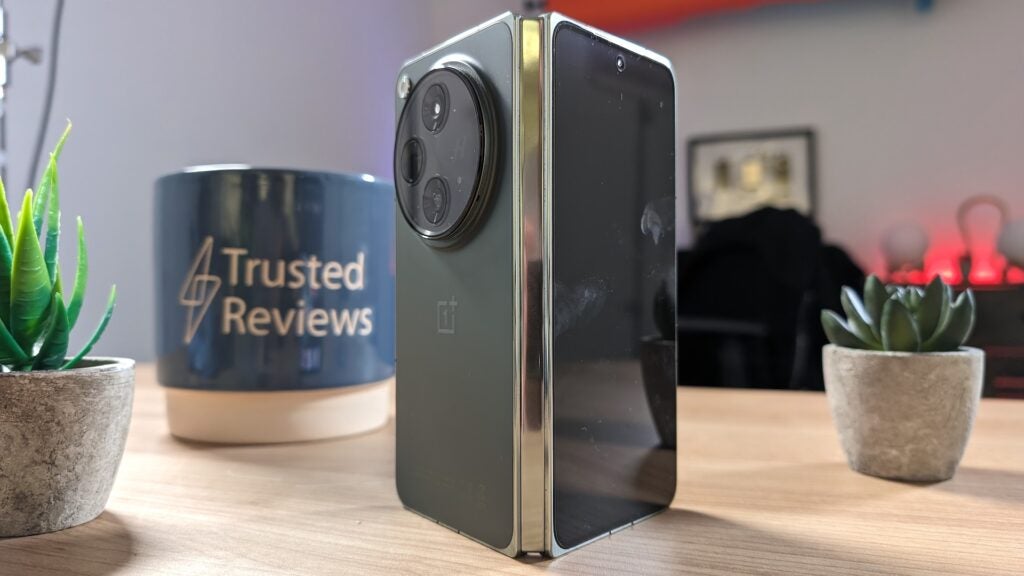
Like other 2023 foldables, the OnePlus Open closes completely flat when folded with no real discernable gap. In fact, you can close a piece of paper between the two halves of the phone and hold the phone up by the paper.
The hinge is also solid, with enough strength to hold its position half-open while not being too hard to open one-handed – though the latter does still take some getting used to.
It’s also relatively thin. It’s not quite up to the standard of the Honor Magic V2’s 4.4mm thickness, but at 5.8mm when unfolded, it’s certainly slimmer than the 6.5mm Z Fold 5, bringing it almost into standard candybar territory.
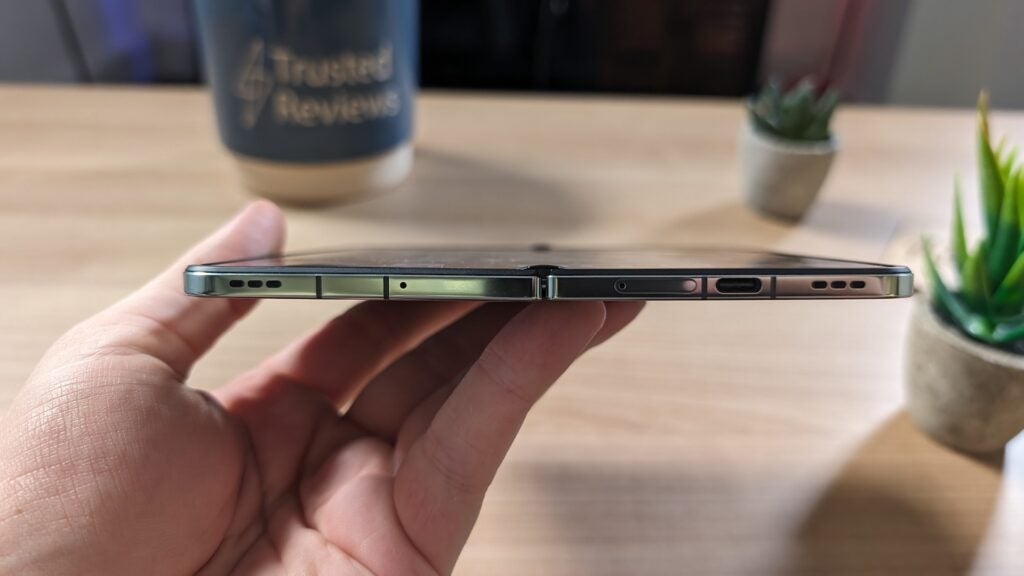
That is somewhat undone by the heft of the device, however, measuring in at a not-insignificant 245g that, while lighter than some foldable alternatives, is still weightier than your average candybar flagship phone.
There’s also the size of the cover display to consider. While other foldables offer a slightly odd cover display aspect ratio, the OnePlus Open offers the closest to a standard smartphone display that I’ve seen so far.
It measures in at 6.3 inches and boasts the same 20:9 aspect ratio as a regular phone, offering no real downside to using the cover display. It’s also likely the area that OnePlus had the most input on during the design process, with previous iterations of Oppo’s Find N sporting a squatter look akin to the Pixel Fold.
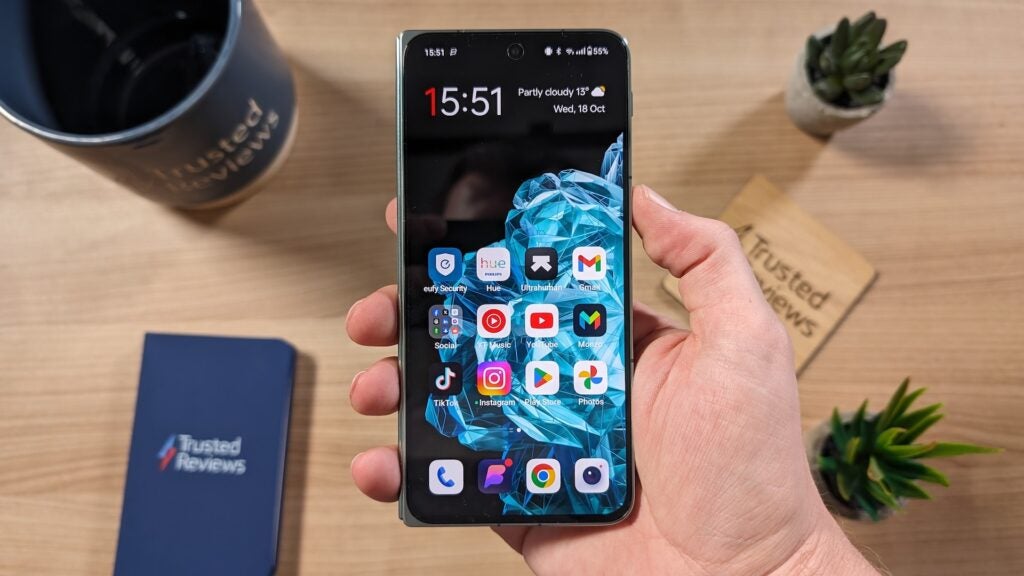
Flip the phone over and you’ll find a rather in-your-face circular camera bump that takes up a rather large section of the rear. Though rather than finding it garish, I like the XL-look of the housing, adding to the distinct look of the foldable rather than detracting from it. I’m also a fan of how the LED flash sits outside of the camera bump, in the top-left corner. It makes no sense, but aesthetically, I like it.
And, yes, being a OnePlus product, the OnePlus Open sports the signature alert slider on the upper-right to quickly switch between loud, vibrate and silent modes.
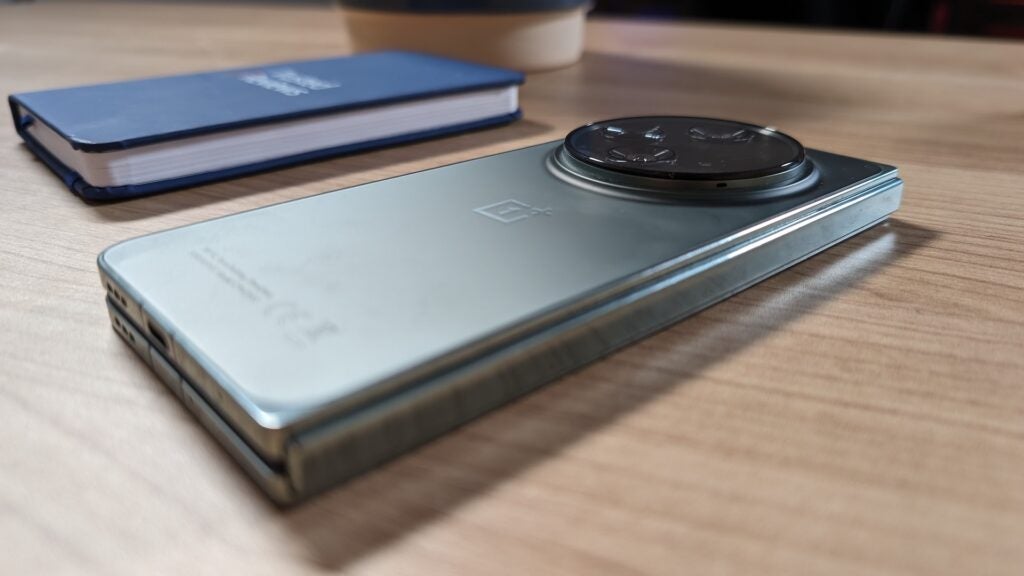
It’s not a complete win, however, with the OnePlus Open’s IPX4 water resistance rating far behind the IPX8 of the Z Fold 5, though OnePlus is confident it’ll survive a stint in the rain – something I found out when caught in a torrential downpour. The only upshot to device protection is the use of Ceramic Guard protection on the cover display, which the company claims is 20% stronger than Gorilla Glass Victus.
It’s not exactly the most environmentally friendly phone either, with OnePlus making no particular claims about using recycled parts within the foldable, and the packaging, although premium, is filled with material that can’t be recycled.
Screens
- 6.3-inch 20:9 cover display
- 7.82-inch internal foldable display
- Premium experience with a minimal crease
As a foldable device, the OnePlus Open will live or die depending on the quality of its exterior and interior displays – and the good news is that both are absolutely exceptional.
The external 6.3-inch ProXDR AMOLED display is the same as you’d find on a flagship phone. That means there’s no downside to using the external display in place of the larger internal one, whether that’s for quickly replying to a text message or playing a game of Call of Duty Mobile.
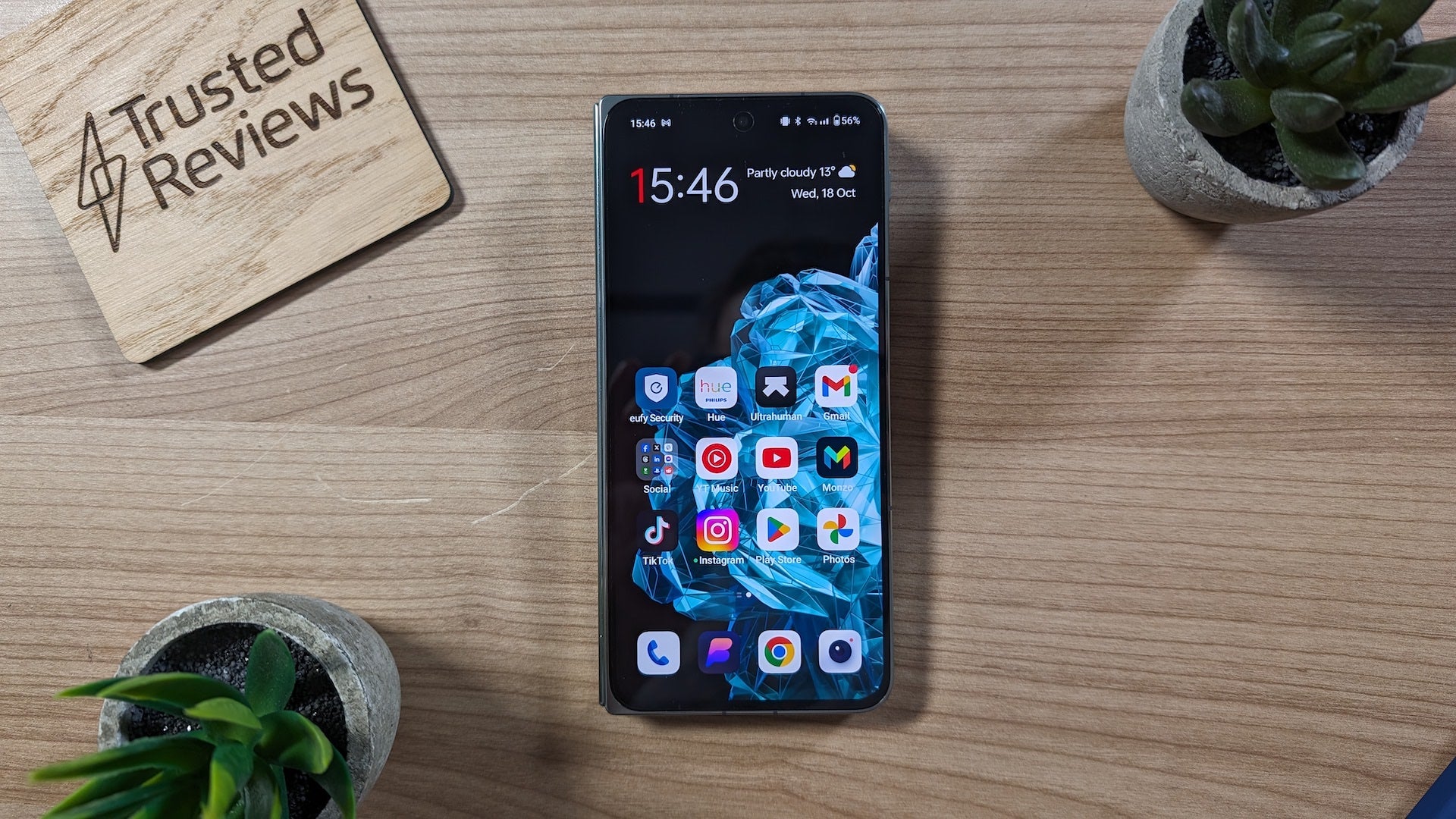
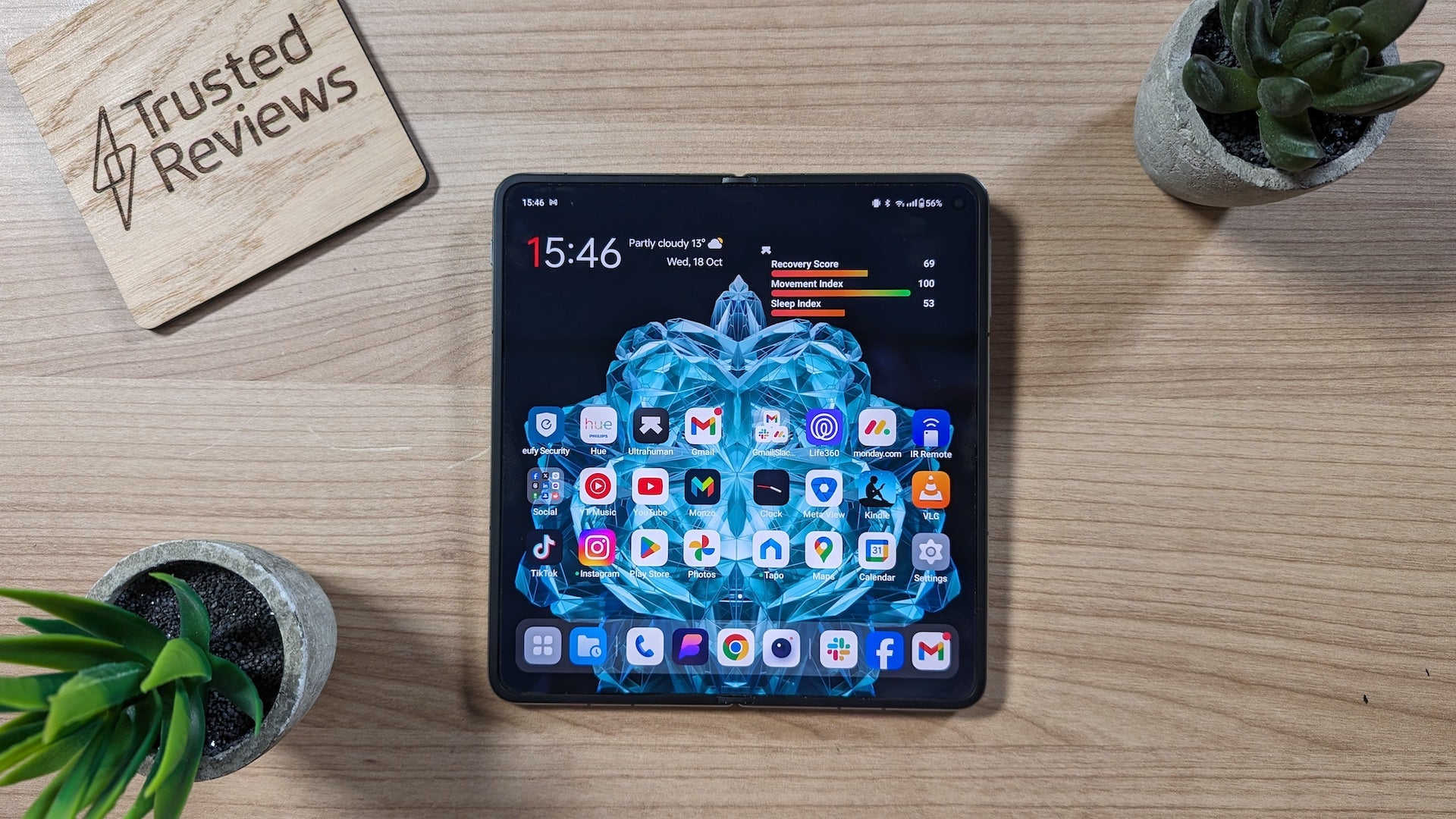
It’s a huge boon compared to the tall-and-narrow cover display of the Z Fold 5, which can not only be comparatively awkward to type on but provides a much narrower view not ideal for portrait content.
It’s comparable in terms of tech to the more premium internal display too, with key figures including a QHD+ resolution, 120Hz refresh rate, 2800nits maximum brightness and support for the likes of Dolby Vision and HDR10+ that delivers a top-notch visual experience with vibrant colours, crisp text and inky blacks.
Of course, it’s all about the inner foldable display, and OnePlus and Oppo have managed to deliver an absolute cracker here.
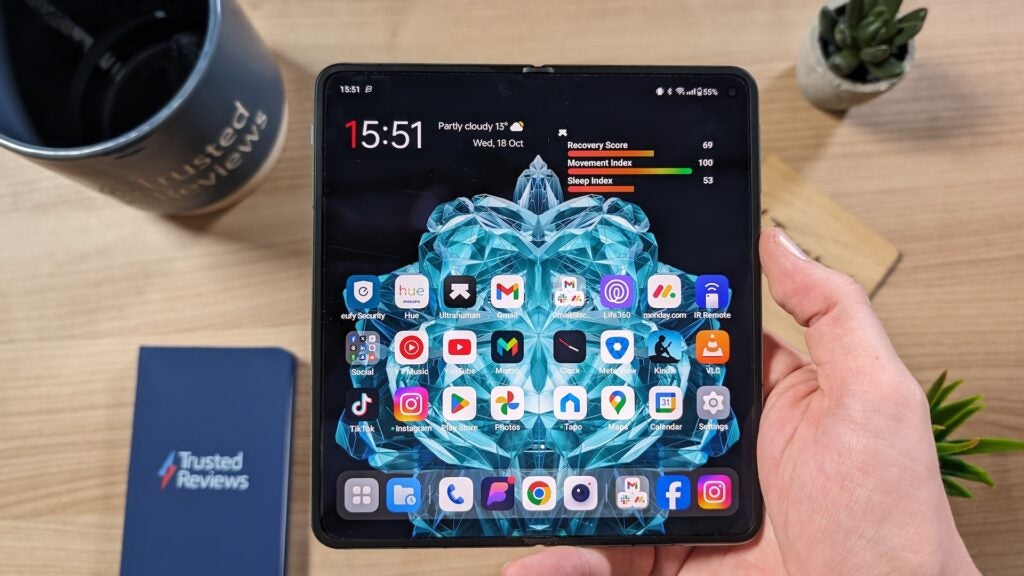
The first thing you’ll notice is the crease, or should I say, lack thereof. While there’s still a slightly visible dent in the display when looked at it off-angle, it’s completely imperceptible when looking at it straight on – even running your finger over the central crease will reveal slight divots rather than the canyons found on the likes of the Pixel Fold and Z Fold 5.
The 7.82-inch ProXDR AMOLED panel is a high-end one, with the same premium bells and whistles as the external display that can deliver an exceptional viewing experience, whether that’s just a quick YouTube video or a two-hour movie on Netflix.
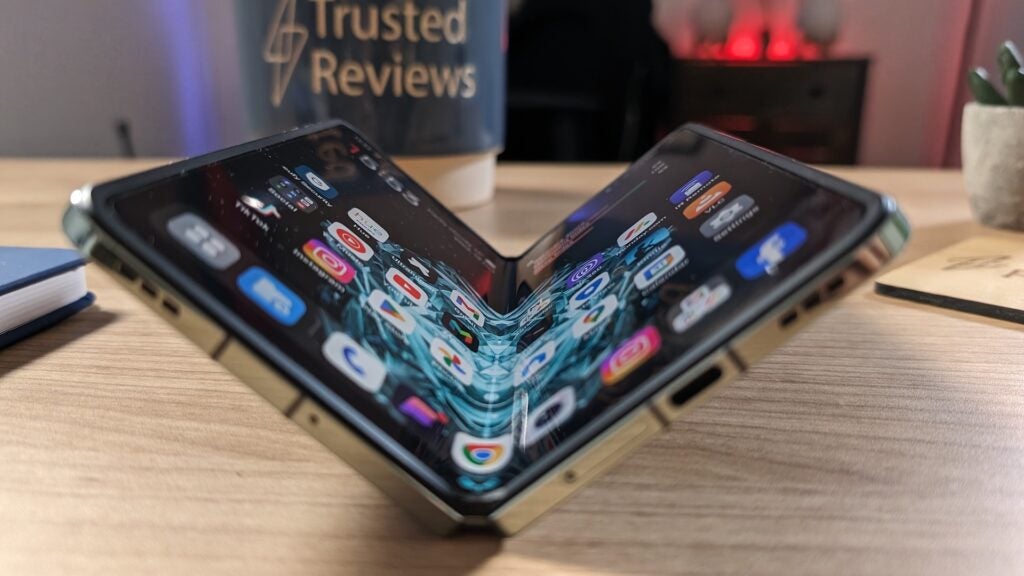
That’s further improved by the hinge system that lets you prop the phone mid-way like a laptop, with apps like YouTube offering dedicated layouts that split the video and video controls onto each half of the screen.
And, unlike the Pixel Fold, the OnePlus Open doesn’t struggle with app support, with practically every popular app from Instagram to TikTok to Slack and YouTube offering a dedicated layout for the larger, internal display.
OnePlus is also confident that the inner display can last an impressive 1 million folds, up quite a bit from the 200,000 of the Z Fold 5, and it’ll also offer unlimited replacements of the internal screen protector for up to two years after purchase.
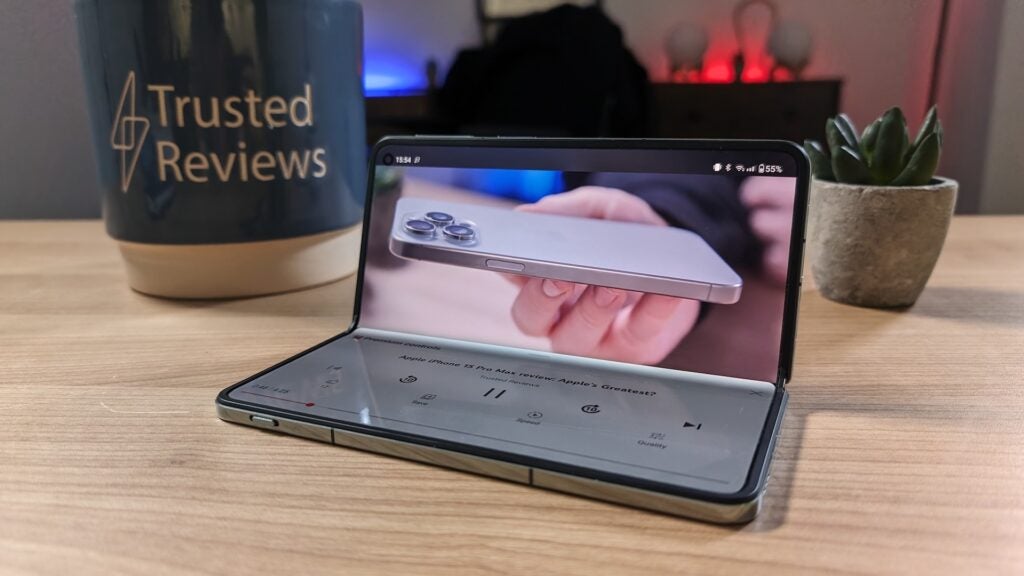
Cameras
- Custom triple camera setup
- Impressive HDR capabilities
- Great periscope lens performance
OnePlus has taken camera performance very seriously with the OnePlus Open, boasting not one but three custom lenses designed specifically for foldables to get the very best performance possible – an aim that has largely been achieved.
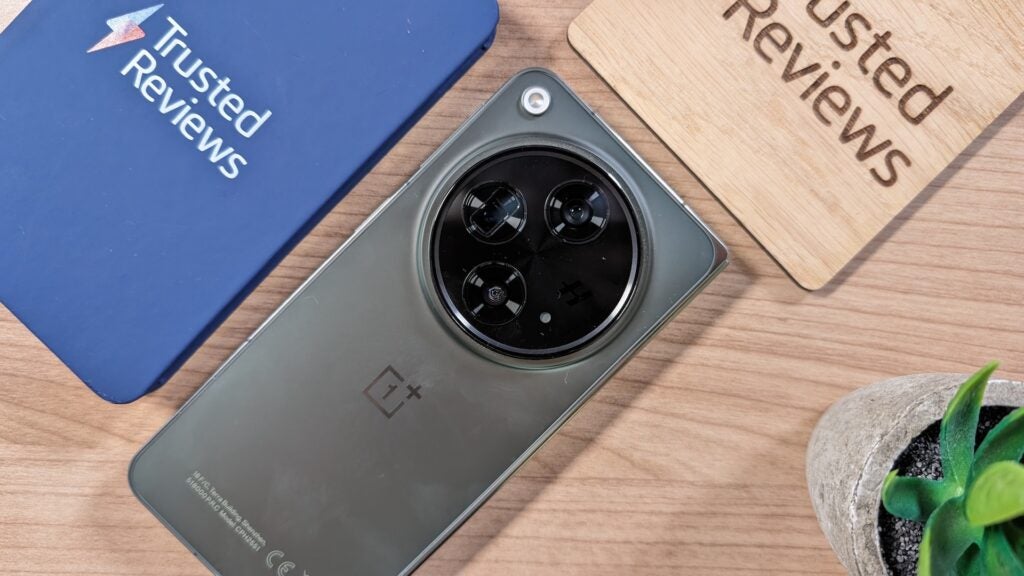
The star of the show is, of course, the main 48MP snapper. It boasts all the premium camera staples including OIS, an impressive f/1.69 aperture and new pixel-stacking tech that allows the sensor to capture more light and detail without a large 1-inch sensor, and as you’d expect, the results largely reflect this.
Images captured from the main 48MP snapper are an absolute delight, boasting great brightness, sharp detail even when zooming into specific parts of a shot and impressively accurate colours that don’t look overly vibrant like some alternatives. There’s also a notable lack of overexposure in even incredibly bright spots in HDR photos, with the sensor able to compensate and balance things out nicely without that over-processed look.
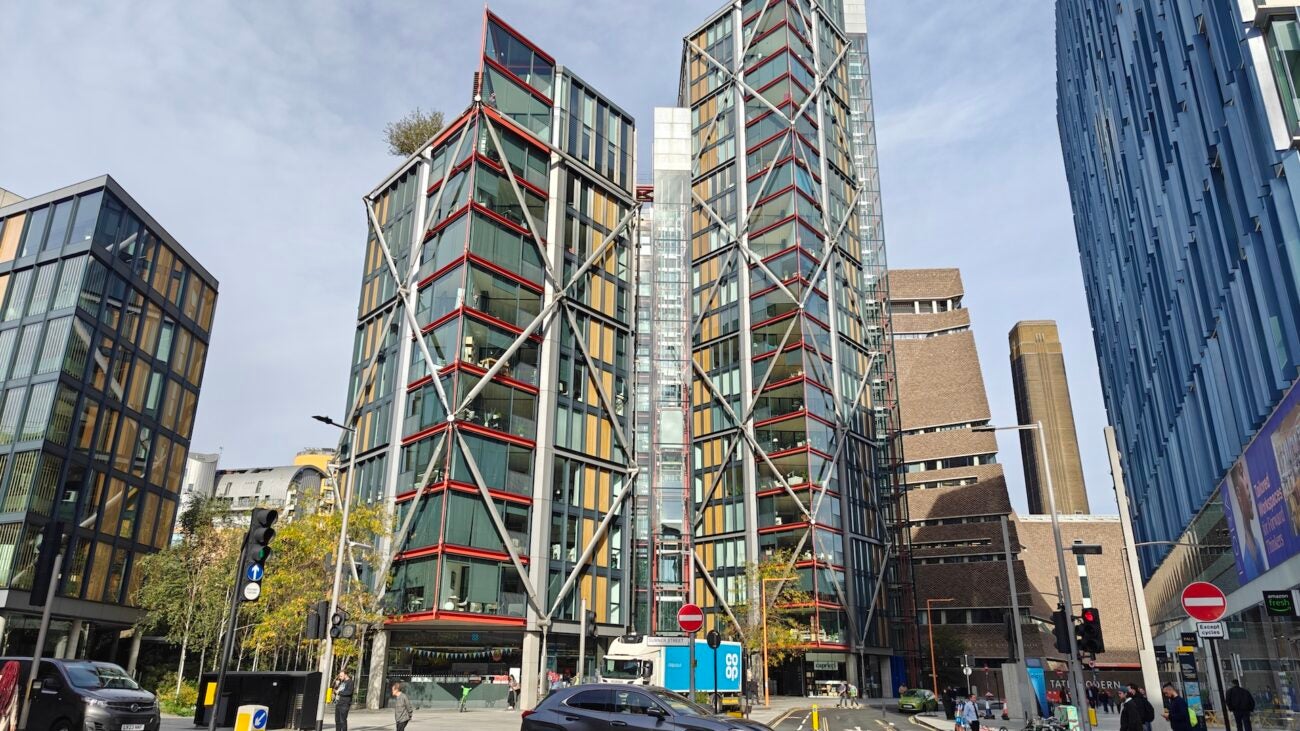







That’s just as true in low-light conditions, with the OnePlus Open able to handle low-light shots with relative ease. Shots I took on a rainy dark walk on a London street revealed crisp detail, balanced lighting and plenty of colour that gives candybar alternatives a run for their money. It’s not the absolute best you’ll find on the market, but it excels in the foldable space.
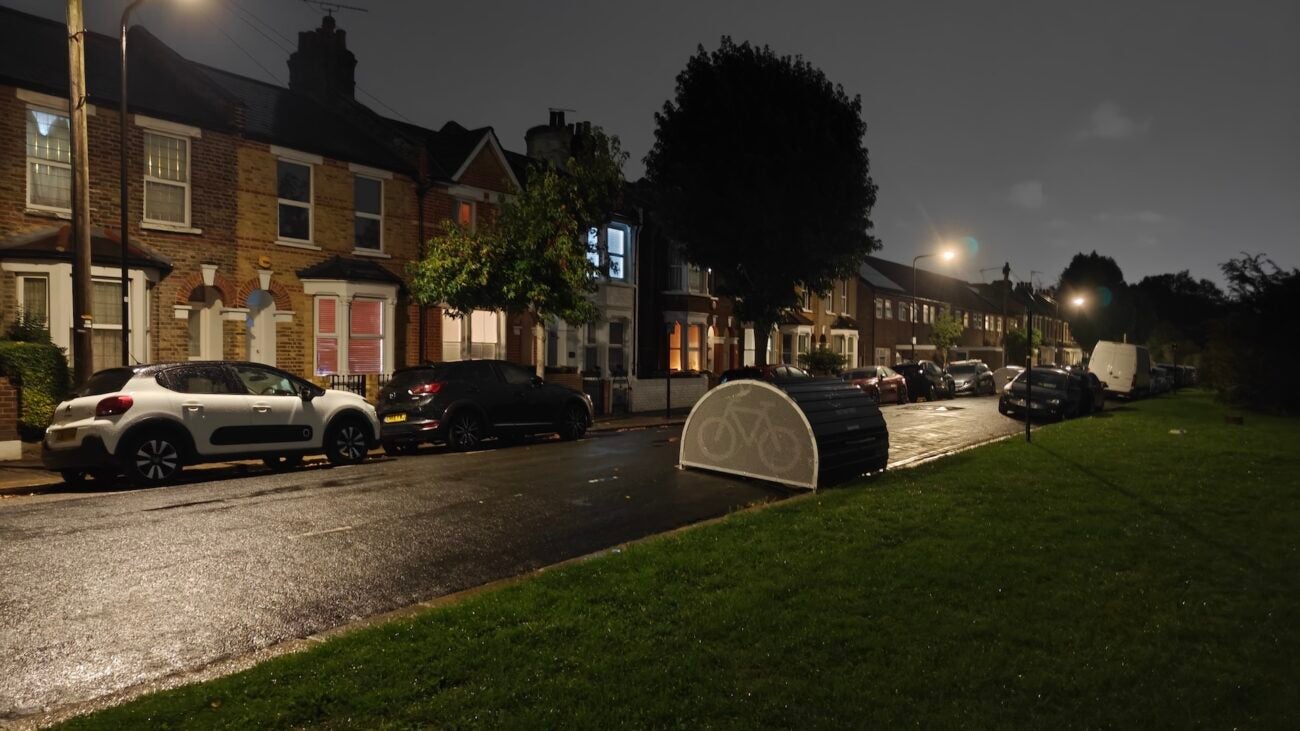

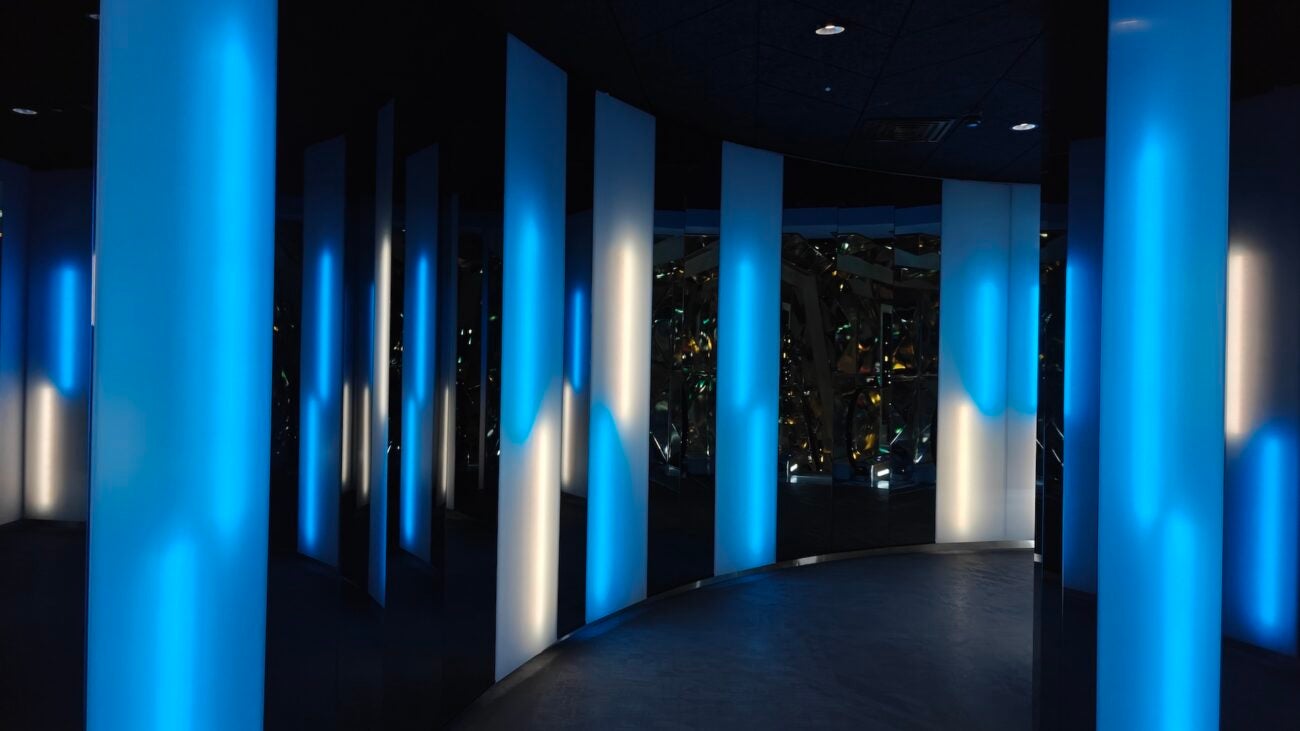
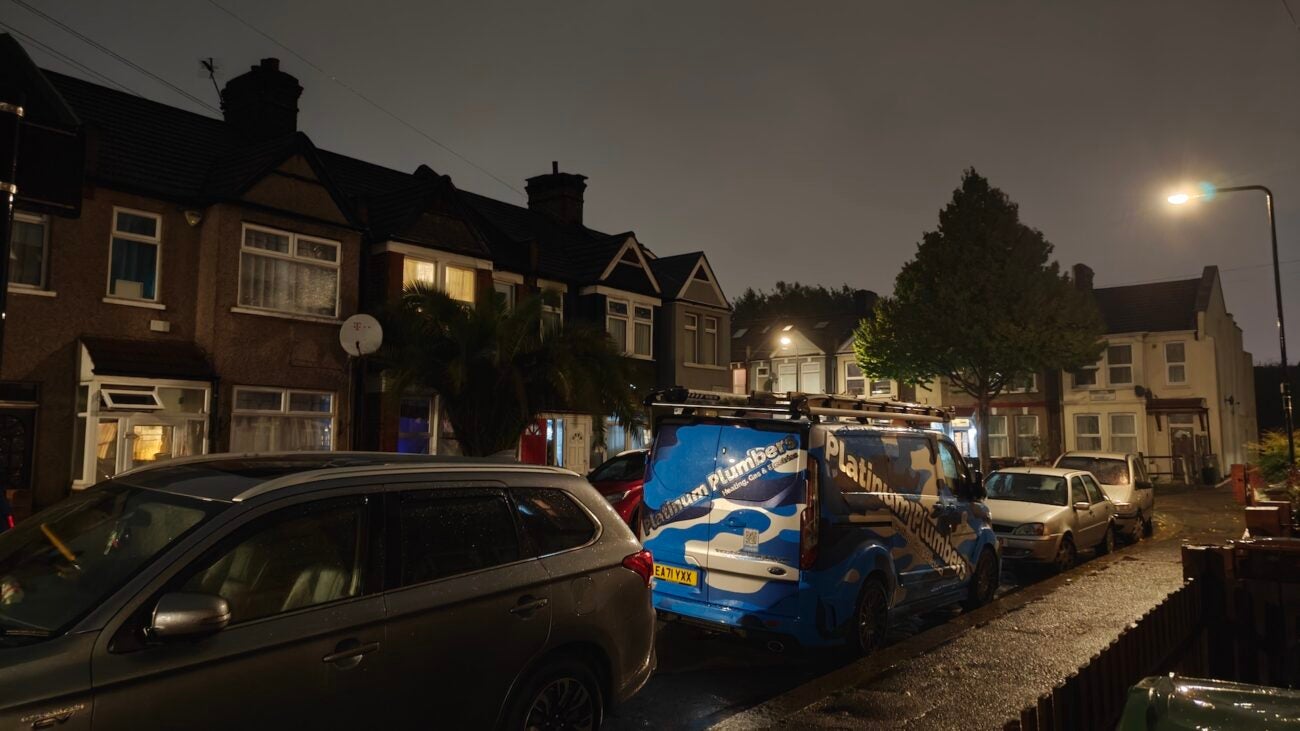
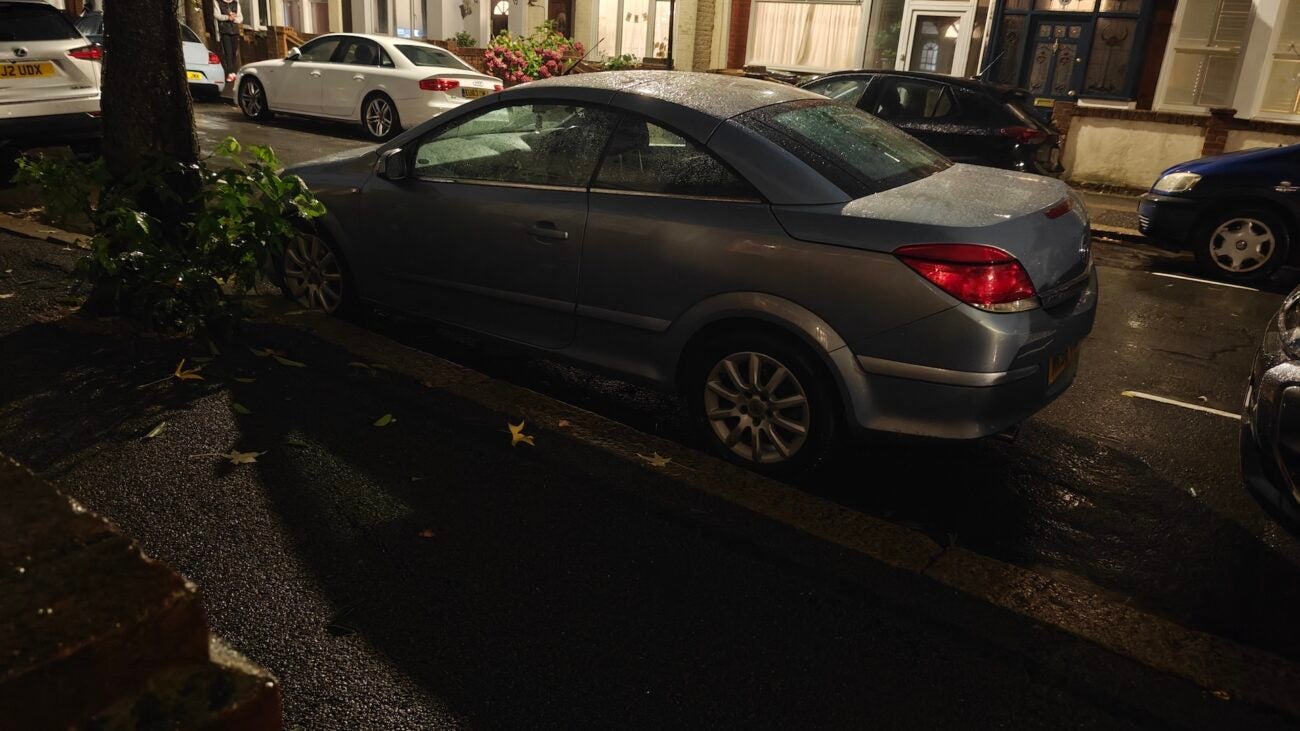
Alongside the main sensor is a particularly capable periscope lens, boasting both a better zoom range and resolution (as well as a larger 1/2-inch sensor) than both the Pixel Fold and Galaxy Z Fold 5.
Another custom lens, the 64MP snapper boasts 3x optical and 6x lossless in-sensor zoom, but even when pushed past those limits, the phone manages to take some impressive snaps. The further the zoom goes, the more digital artefacting you’ll see, with photos at 120x barely recognisable, but it allowed me to take some impressive snaps of a squirrel sitting on my garden fence at around the 18x mark.
Even at the standard 3x and 6x, the quality is impeccable, allowing me to capture some close-up Zoolander-esque poses from my (very photogenic) cat Alan. You can easily see minor details like individual strands of hair and plenty of detail around the eyes. I tend to avoid telephoto lenses as there’s usually a notable drop in overall light and quality, but that doesn’t really seem to be the case here.




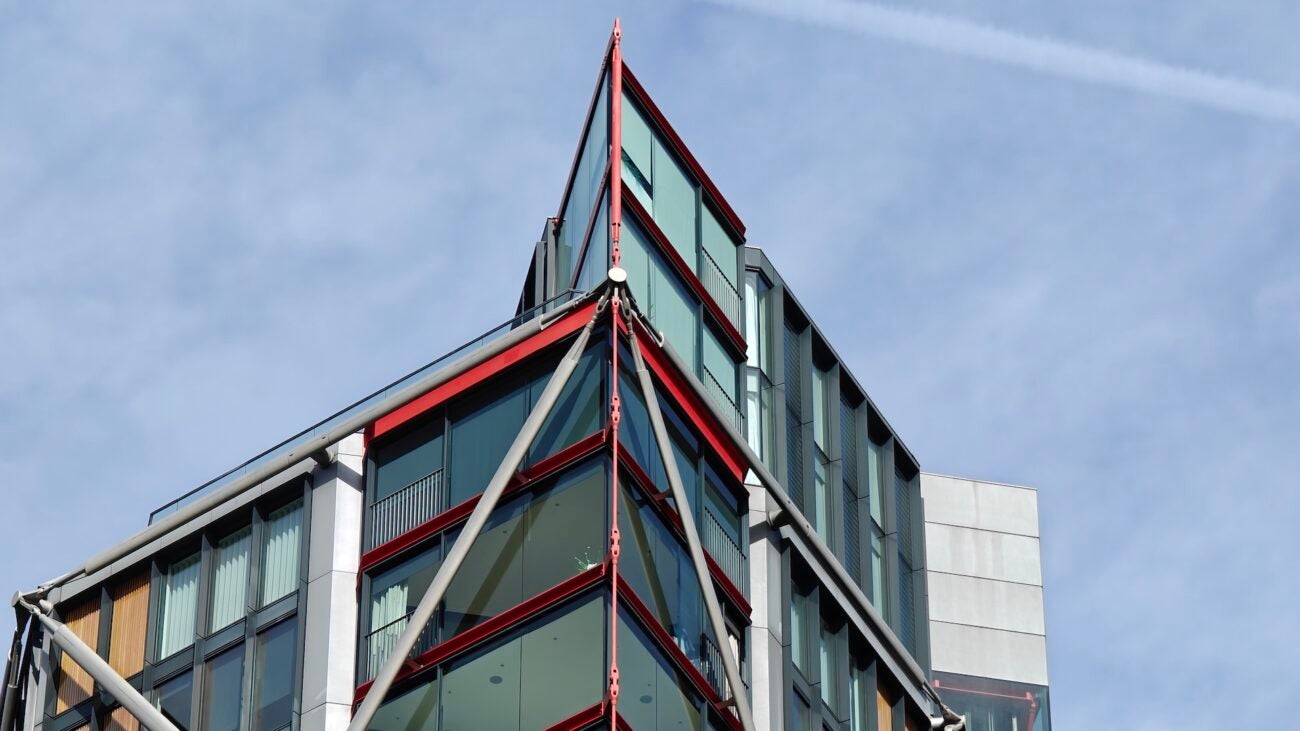



Wrapping up the trio of rear lenses is a 48MP ultrawide that’s surprisingly similar in terms of overall detail, light and colour tuning to the main lens. It’s great for scenic shots, group selfies and artsy photos, but with a smaller sensor and narrower aperture than the main sensor, it’s not quite as capable as the light levels begin to drop.


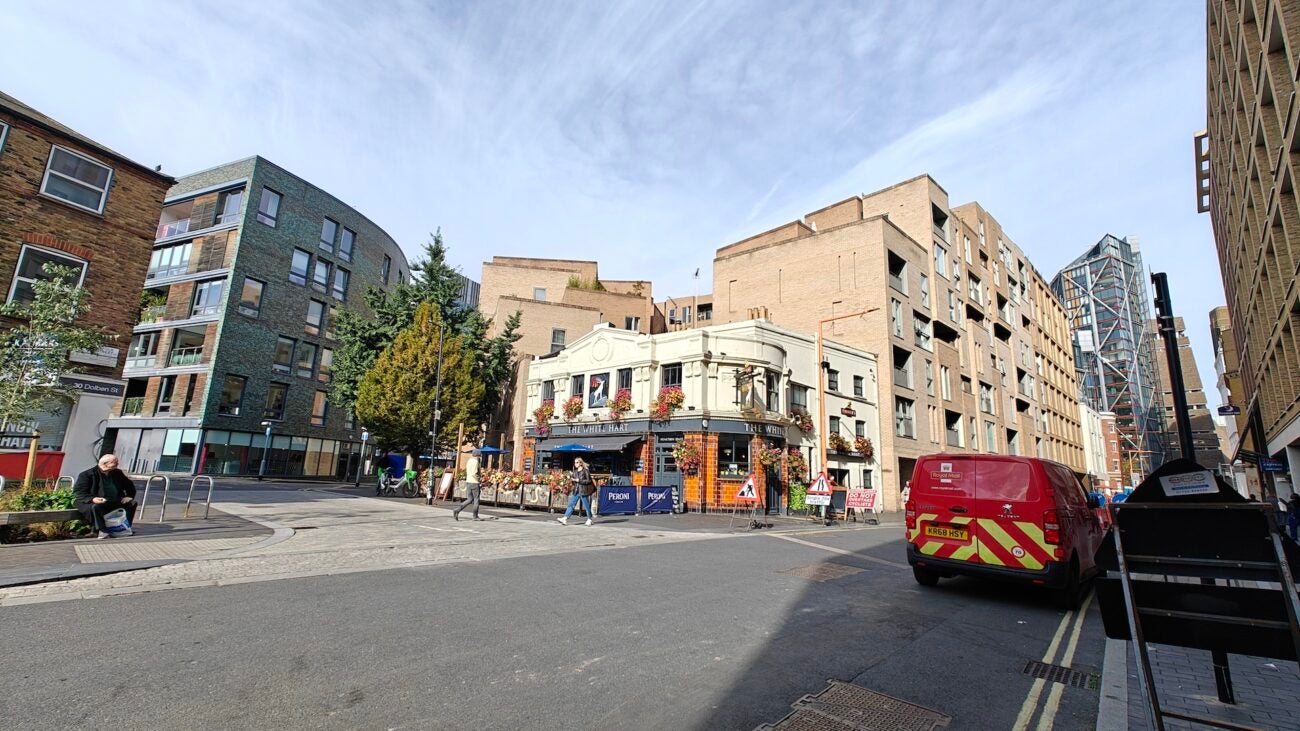
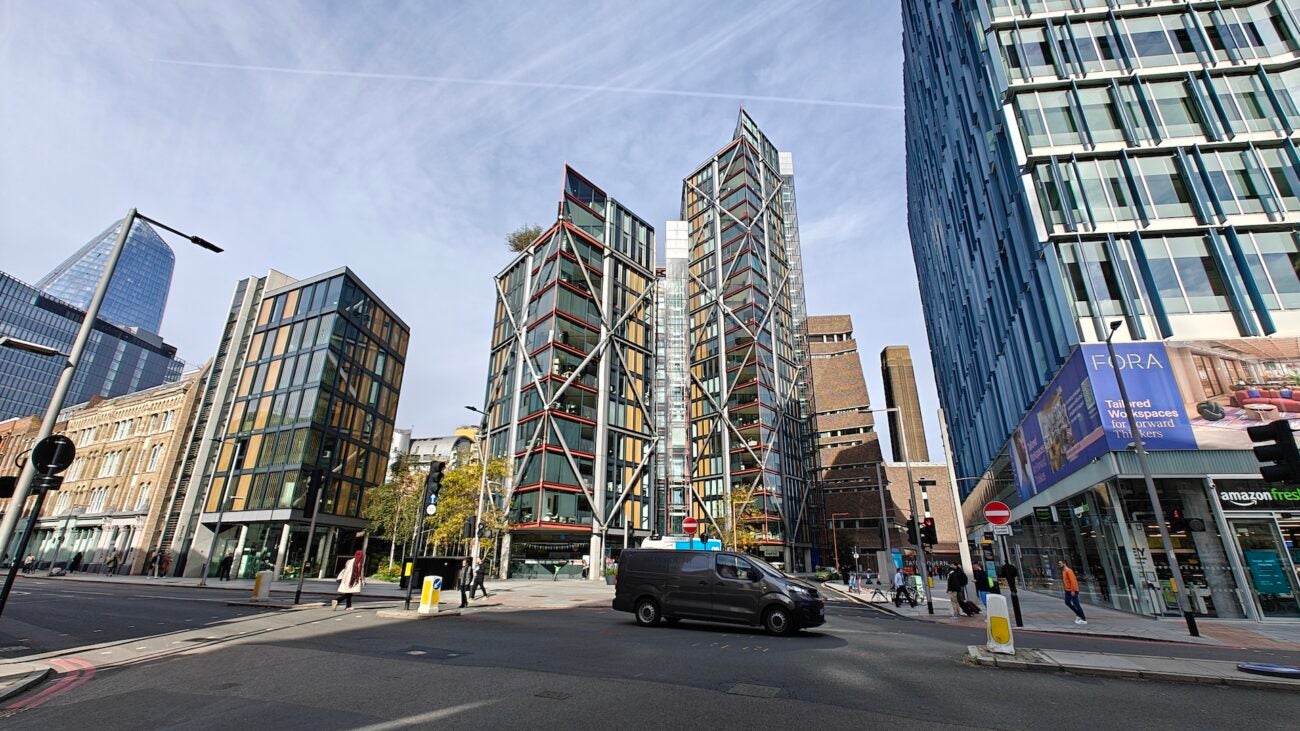
Expect strong selfie performance from the two front-facing cameras – 32MP on the external, 20MP on the internal – with both being ideal options for a quick selfie and for use in video calls, though the foldable nature of the phone means you can just as easily use the trio of rear lenses to take a selfie using the cover display when unfolded.
Video performance is also strong, capping out at 4K@60fps, and you’ve also got other tech like Dolby Vision Video – a first for OnePlus – and a Pro Mode that allows for LUT recording, both great for pro-level shooting. My only real complaint is that the OIS, while notable, isn’t as strong as what you’ll find on an iPhone or even some other Androids, with a notable bob as I was walking along.
Performance
- Snapdragon 8 Gen 2
- 16GB of LPDDRX5 RAM
- Top-end performance
As you might expect from an ultra-premium device, the OnePlus Open sports flagship internals that offer a responsive, rapid mobile experience. More specifically, you’ll find the Snapdragon 8 Gen 2 within the foldable, coupled with a whopping 16GB of LPDDR5X RAM and 512GB of UFS 4.0 storage that allows it to take on practically anything you throw at it.
The Snapdragon 8 Gen 2 is a capable flagship chipset that has no issue delivering a top-notch experience, whether that’s instantly loading apps, delivering buttery-smooth animations (that look even nicer with the 120Hz refresh rate) or playing AAA games with high-end textures enabled.
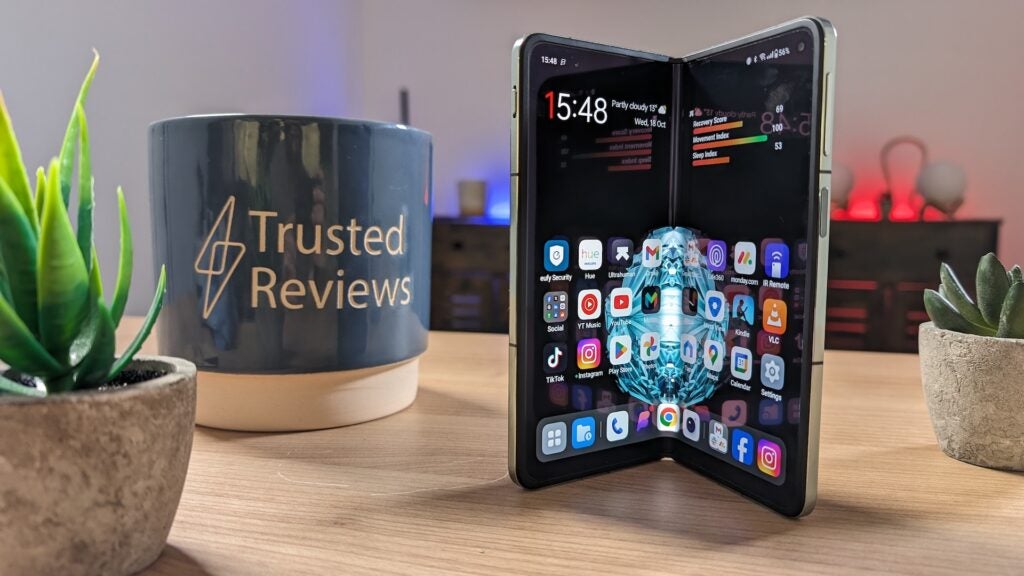
On the latter point, the OnePlus Open does a great job of staying cool under load, with the phone only getting marginally hotter than usual after 30 minutes of Call of Duty Mobile – an impressive feat that meant gameplay stayed at a solid 60fps with no stutter or lag at any point.
That’s apparently down to OnePlus’ new 3D cross-hinge cooling system that can intelligently move heat around the two halves of the phone for better heat dissipation and performance. It can also redirect heat towards the battery in extremely cold conditions to deliver a faster charging experience.
That flagship performance also translates to connectivity, with staples like 5G, Bluetooth and NFC accounted for along with support for the latest Wi-Fi 7 in countries where it’s currently available.
Donning a stereo speaker setup comprised of two speakers on top and one at the bottom, the OnePlus Open is certainly capable of a loud, immersive sound experience that’s perfect for casually watching TikTok or YouTube videos. You might worry that the sound is uneven given the uneven pairing of speakers, but the lone bottom speaker is much louder than the two top-facing speakers which helps balance it out.
That’s further improved by both Dolby Atmos support and OnePlus’ Spatial Audio support, with both significantly enhancing the audio experience when connected to Bluetooth headphones.
Software
- OxygenOS 13.2 based on Android 13
- Unique Open Canvas multitasking system
- 4 OS upgrades, 5 years of security patches
Software is another area where the OnePlus Open goes above and beyond what the competition is offering – and it’s also one of the only key differentiators between the OnePlus Open and Oppo’s Find N3 with the two collaborating on the hardware aspect.
The OnePlus Open runs Android 13 with the company’s OxygenOS 13.2 software update, though it has promised that the foldable will get the update to Android 14 in the form of OxygenOS 14 before Christmas. The good news is that, even with Android 13, the OnePlus Open does some cool stuff not seen on any other foldable before.
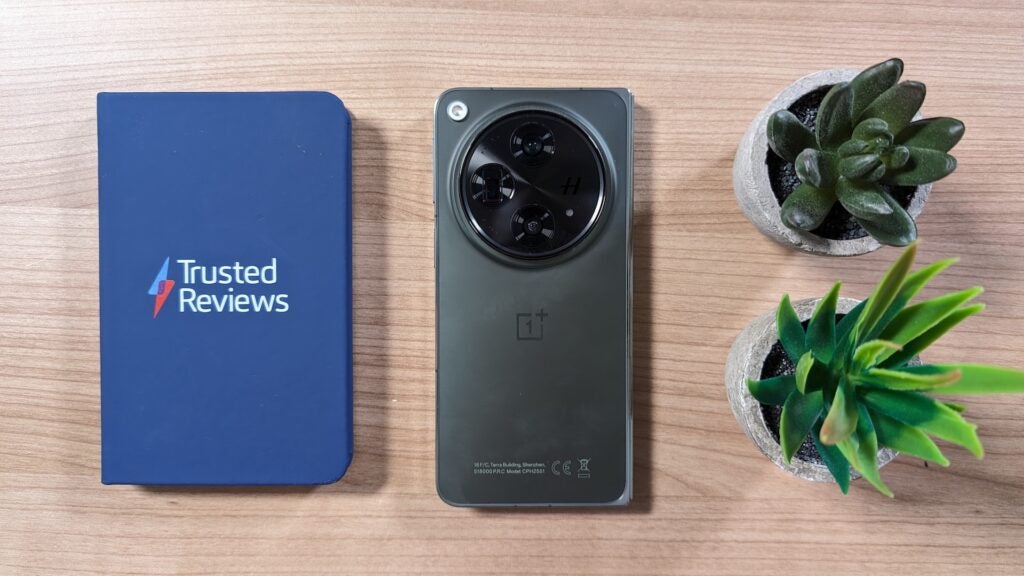
The highlight for me has to be Open Canvas, OnePlus’ unique take on split-screen multitasking on book-style foldables. While most foldables let you run two or three apps on screen at once, they’re often limited to the narrow smartphone layout or compact floating windows, and these aren’t ideal for getting a lot of work done.
Enter Canvas. It’s essentially a new way of looking at multitasking by loading up to three apps in full-screen mode with a simple tap of the edge of the screen to switch between them. Think of the extra apps as living just outside of the screen, and can be called in with a tap or swipe.
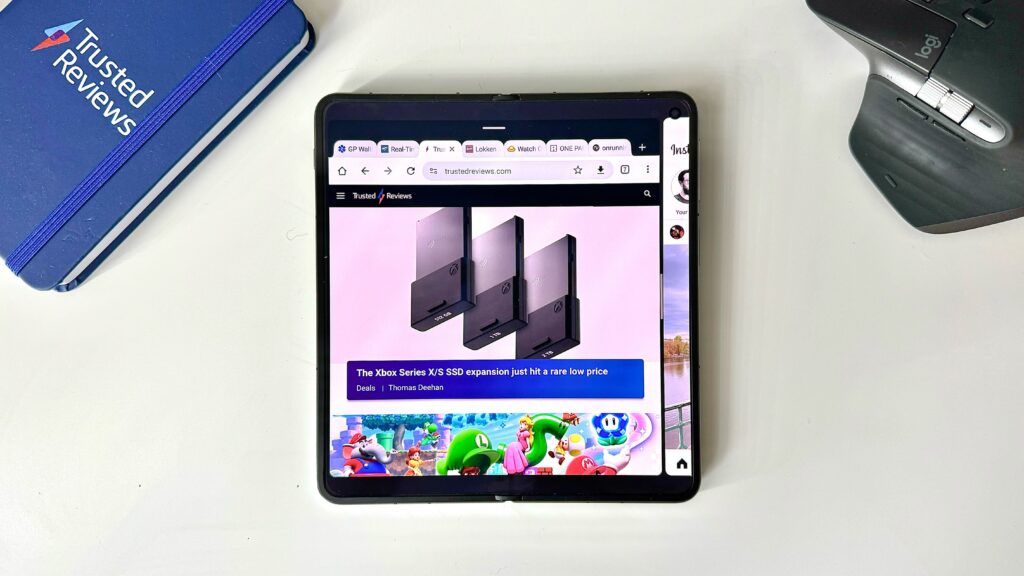
The software handles practically every app that supports the big internal aspect ratio, with the ability to run in full-screen, compact mode or any combination of the two, with users able to both customise the layout of the apps and save the group to the home screen for quick access later on.
Elsewhere, you’ve got the Files shortcut that lives in the iPad-esque toolbar on the inner display that provides quick access to your photos, videos, documents and other files for drag-and-drop sharing, and small elements like being able to close the phone and swipe on the outer display to continue what you were doing.
That experience is set to continually improve too, with OnePlus committing to 4 OS upgrades and 5 years of security patches that’ll see the foldable through to Android 17.
Battery life
- 4805mAh battery
- Comfortable all-day battery life
- 68W SuperVOOC charging
Within the OnePlus Open are two battery cells – one 3295mAh cell, one 1510mAh cell – split across the two halves of the phone, equating to a total of 4805mAh. While that’s still shy of the 5000mAh cell you’ll find in most candybar smartphones in 2023, it’s not that far off and represents a boost compared to other book-style foldables like the Pixel Fold and Galaxy Z Fold 5.
Combined with a power-efficient chipset and LTPO display tech, that translates to solid battery life that didn’t leave me wanting for more during my time with the OnePlus Open.
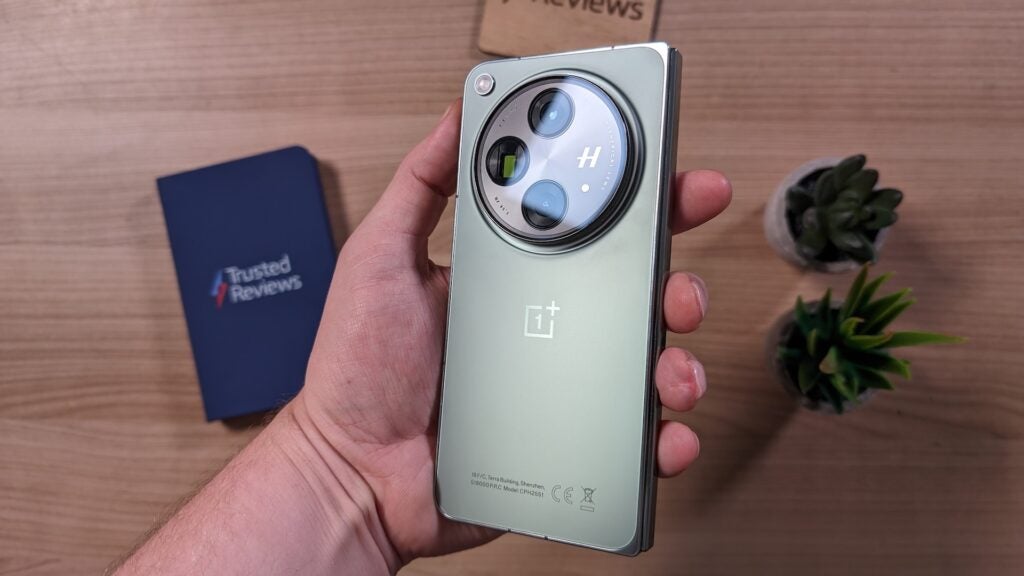
I’m not exactly what I’d describe as a true power user, but my phone is usually unplugged for about 18 hours at a time with around 3-5 hours of screen-on time split across tasks like texting, replying to emails, scrolling through TikTok and reading on the Kindle, and I never once ran out of battery in a single day.
I got close a couple of times, including one day with just over 5 hours of screen-on time including streaming live video from the Quest 3 to the internal display for over an hour, which left me with 9% at the end of the day, but it still managed to last. While that’s not quite enough for multi-day battery life, it alleviated the battery anxiety I’ve felt with foldables like the Pixel Fold this year.
More specifically, the OnePlus Open drained just 7% over an hour of Netflix HDR playback on the larger inner display, while a 30-minute light gaming session saw 8% drain, painting a capable picture of overall battery life.
Expect a rather rapid charging experience with SuperVOOC 68W support that delivers 50% charge in 22 minutes and a full charge in 46 minutes in tests. That’s the fastest of any book-style foldable available in Europe right now, and means that quick top-ups are entirely possible if you do find your battery dwindling towards the end of a busy day.
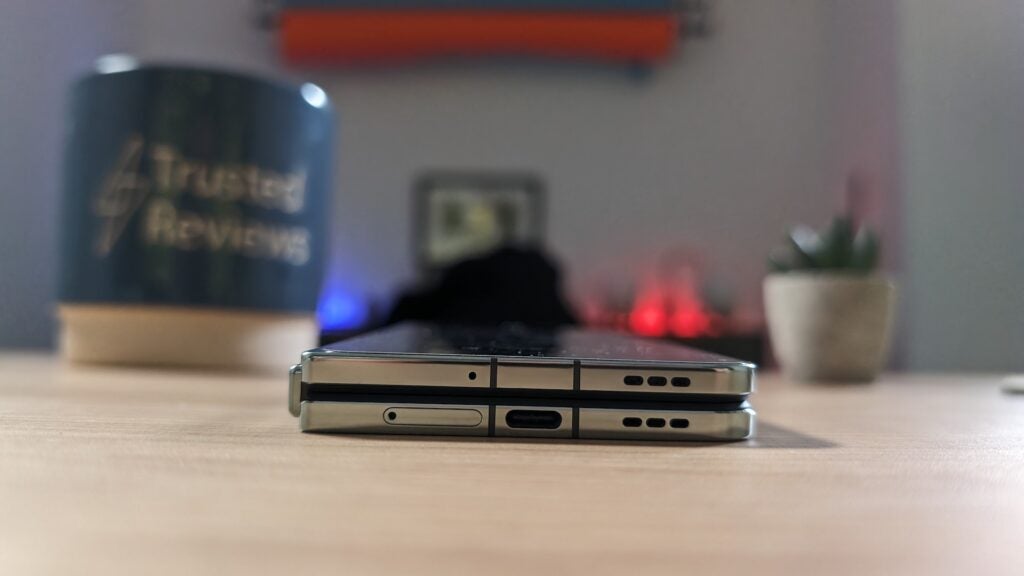
You won’t find wireless charging here unfortunately, but I’d argue that fast wired charging is more of a boon than the convenience of much slower wireless charging anyway.
And, yes, you get the SuperVOOC charger in the box – no need to buy it separately.
Latest deals
Should you buy it?
You want a no-compromise foldable
With a smartphone-esque cover display, great performance, solid cameras and fast charging, the OnePlus Open delivers a no-compromise foldable experience.
You want the best protection possible
While Ceramic Guard should protect the cover display, the OnePlus Open’s IPX4 water resistance rating falls short of the IPX8 of the Samsung Galaxy Z Fold 5.
Final Thoughts
The OnePlus Open is the no-compromise book-style foldable that the industry has been waiting for. It sports a clean, premium design with a smartphone-first 6.3-inch 20:9 120Hz AMOLED cover display that feels normal to use.
However, it’s the inner 7.82-inch 120Hz AMOLED panel that steals the show, with a near-invisible crease that’s only notable when looking at it side-on. Compared to the deep creases from Google and Samsung, it’s a huge step forward.
There’s also the camera setup that uses three custom high-res lenses designed for foldables that deliver a notable boost in overall performance compared to options from Samsung, possibly even giving the Google Pixel Fold a run for its money.
Granted, it’s not the lightest or thinnest foldable – that goes to the Honor Magic V2, which is yet to get a European launch – and it’s not quite as protected as the Samsung Galaxy Z Fold 5 with IPX4 water resistance, but it does so much so well that it’s truly hard to fault, especially when it’s much cheaper than most of the foldable competition.
However, even at a cheaper £1,599, it’s still an expensive buy, making the fact it’s only available to buy outright – rather than on contract like the Z Fold 5 – a challenge for some.
How we test
We test every mobile phone we review thoroughly. We use industry-standard tests to compare features properly and we use the phone as our main device over the review period. We’ll always tell you what we find and we never, ever, accept money to review a product.
Find out more about how we test in our ethics policy.
Used as a main phone for over a week
Thorough camera testing in a variety of conditions
Tested and benchmarked using respected industry tests and real-world data
FAQs
An IPX4 rating means it’ll survive a stint in the rain, but it’s not quite as protected as the IPX8 Samsung Galaxy Z Fold 5.
Yes, you’ll get a 68W SuperVOOC charger in the box with the OnePlus Open.

